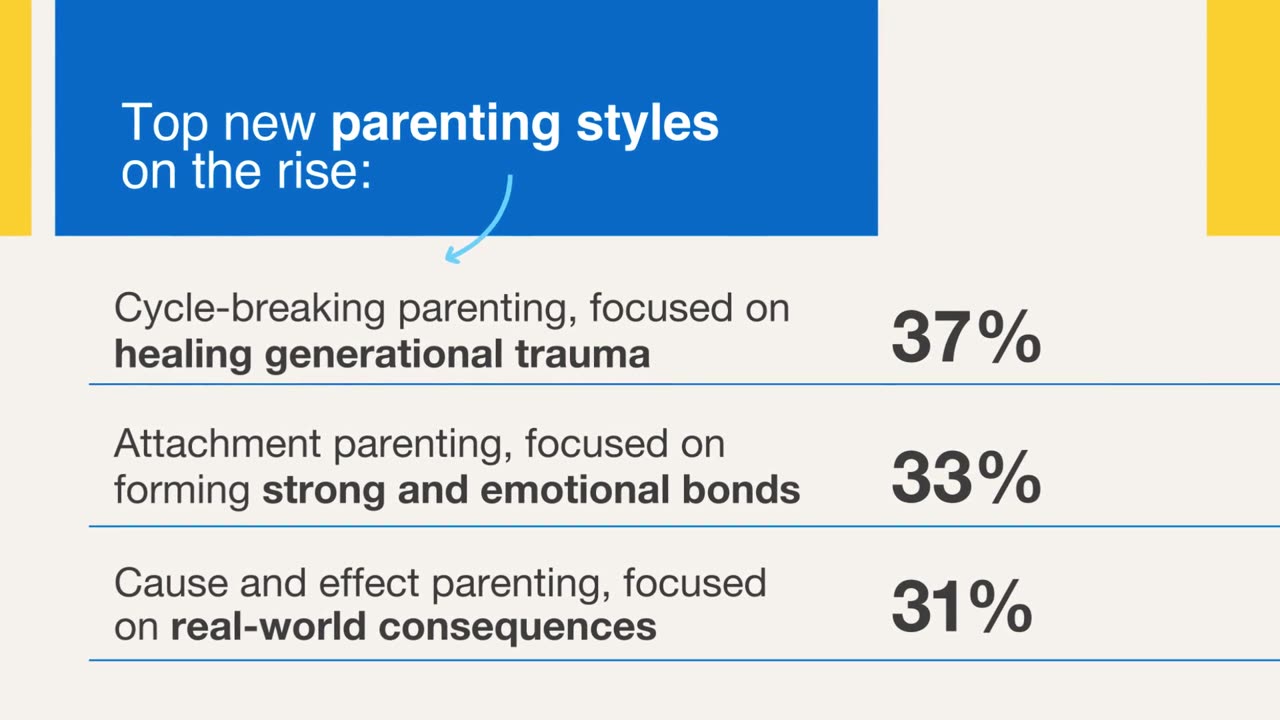Premium Only Content

Parenting trends shift as cycle-breaking becomes most popular style
Cycle-breaking, attachment and cause-and-effect parenting are some of the top parenting styles now on the rise for America’s youngest kids, according to new research.
A survey of 2,000 parents of children ages 0-6 found that modern parents are using new styles, focused on healing generational trauma, or cycle-breaking (37%), forming strong and emotional bonds, or attachment (33%) and prioritizing real-world consequences, or cause and effect (31%).
Despite Gen Z being the first generation raised with “gentle parenting” in mind, only 32% employ this approach as parents, instead leaning more towards cycle-breaking parenting (41%).
Though still popular with millennials (41%), Gen Z parents believe that gentle parenting only works for some situations (43%) and has its time and place (38%). Still, younger parents believe that this approach needs to be blended with other styles (39%).
Conducted by Talker Research on behalf of Kiddie Academy, results revealed that this may be because more than four in five parents polled (85%) agree that there’s no “one size fits all” approach when it comes to parenting. This makes today’s parents more versatile than ever, as they blend an average of three different parenting styles.
When it comes to how they decide which approach to use, Gen Z parents prioritize preparing their child for the real world (54%), while millennial parents are focusing on supporting their child(ren) mentally and emotionally (62%).
Results also revealed that many parents want to be the “fun” parent (40%), though only 26% feel they actually live up to that. On the flip side, only 7% of parents surveyed want to be seen as the “hard” or “strict” parent, though one in five (20%) feel that’s where they actually land.
The survey gave parents 20 seconds to select an answer, or react to real-life scenarios they may find themselves in with their child, looking to gauge their gut instincts.
Results found that if their child were to knock everything off the shelf in the grocery store, nearly half of parents (48%) are most likely to share the burden of cleaning everything up with their child, and even go so far as to explain why it was wrong. This combines the empathy of gentle parenting with the equal status of parent and child, often associated with child-led parenting.
Others are more divided between immediately making their child clean up the aisle on their own (32%)—cause and effect parenting—or apologizing for their child’s actions to staff and those around them (31%), which has glimmers of the obstacle-removing or accountability-avoiding pieces of bulldozer parenting.
Another scenario asked parents what they would do if their child was having a tantrum in the car, throwing things around the back seat and into the front seat.
Two in five parents (44%) said they’d calmly explain to them why this is dangerous, though others realize that “gentle parenting” approach only goes so far.
Forty-two percent would pull the car over until their child has calmed down, while a similar number (40%) would wait until they get home to give their child consequences or even go so far as to take all items for the rest of the ride (34%). These reactions blend the realistic, cause and effect parenting emphasis with a traditional authoritative parenting style.
When asked about real life scenarios with their child and how they handled it, one parent said, “My child refused to do their homework. I stayed calm, listened to their concerns and explained the importance of responsibility. I used a combination of authoritative parenting and positive reinforcement, praising them when they completed tasks, which helped them feel supported and motivated.”
“Results revealed that following a stressful situation with their child and upon further reflection, parents would handle an average of 55% of those scenarios differently. This underscores the fact that no one parenting style is the end all be all, especially since 84% of parents say their styles have evolved as their child gets older,” said Joy Turner, vice president of education for the Kiddie Academy brand. “Parents are learning along with their children, seeking to find the best way to support each other and adjusting as the journey unfolds.”
Seven in 10 parents are choosing parenting styles based on what their child needs, rather than trying to make their preferred style work regardless of their child’s personality (23%).
Still, 39% admit their parent style changes depending on whether they’re in public or in private and another 34% admit it’s even subject to change depending on who they’re with.
Almost four in five (79%) parents would go so far as to say it’s important that their child’s early education provider use the same styles and approaches that they do at home.
“The good news is that almost half of parents (47%) are trusting their own intuition when it comes to parenting advice and guidance. But still, only 18% are leaning on their child’s daycare or early childhood education provider,” said Turner. "A child’s first five years are so important for their growth and development and leaning on your child’s early education provider can make all of the difference. You can still be the type of parent you want to be and with your village behind you, you’ve got this.”
WHAT TYPES OF PARENTING STYLES ARE POPULAR TODAY?
Gentle parenting (emphasizing empathy and understanding rather than punishment) - 38%
Cycle-breaking parenting (focuses on healing generational trauma and avoiding repeating harmful family patterns or behaviors) - 37%
Attachment parenting (forming strong emotional bonds through physical closeness and repetition) - 33%
Cause and effect parenting (real world consequences over lectures or punishments, letting reality be the teacher) - 31%
Tech-conscious parenting (prioritizes intentional screen time and digital exposure, typically a healthy balance of tech use without full bans) - 23%
Child-led parenting (sees children as equals to adults, focuses mostly on emotional development, emphasizing validation over obedience) - 20%
Minimalist parenting (simplifying family life by reducing excess, such as toys, commitments or material possessions) - 13%
Bulldozer parenting (removing all obstacles so their child avoids struggling, often solves problems for their child and are success-oriented) - 12%
Survey methodology:
Talker Research surveyed 2,000 parents of children ages 0-6; the survey was commissioned by Kiddie Academy and administered and conducted online by Talker Research between Aug. 21 and Aug. 27, 2025.
-
 0:39
0:39
SWNS
6 days agoSurvey reveals girls’ nights recharge 8 in 10 women
24 -
 LIVE
LIVE
Right Side Broadcasting Network
4 hours agoLIVE: President Trump Participates in Bilateral Meetings in NYC - 9/23/25
2,221 watching -
 LIVE
LIVE
Barry Cunningham
1 hour agoPRESIDENT TRUMP HOLDS MEETINGS AT THE UNITED NATIONS!
1,195 watching -
 1:58:02
1:58:02
The Charlie Kirk Show
2 hours agoAllie Beth Stuckey on the Charlie Kirk Revival | Kirk Cameron | 9.23.2025
52.5K11 -
 LIVE
LIVE
StoneMountain64
44 minutes agoHitting Max lvl in Arena Breakout Infinite
78 watching -
 LIVE
LIVE
Badlands Media
12 hours agoGeopolitics with Ghost Ep. 41
724 watching -
 1:07:21
1:07:21
Timcast
2 hours agoTrump Declares Antifa TERRORISTS, The Ultimate Test For The U.S. And Threat Of Civil War
159K82 -
 3:45:31
3:45:31
MattMorseTV
5 hours ago $7.66 earned🔴Trump's United Nations BOMBSHELL.🔴
59.3K23 -

Rebel News
1 hour agoRebels on the ground for ostrich cull, New hate crime bill, Ford on homeless crisis | Rebel Roundup
3.09K7 -
 4:23
4:23
Michael Heaver
9 hours agoItaly Suffers Extreme BLOCKADE
2.68K4